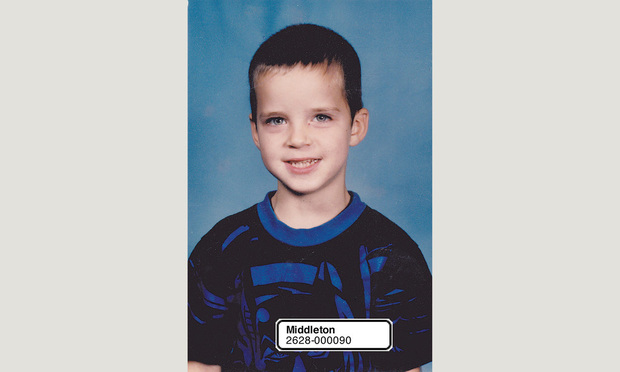The history of American case law is full of tragic cases, perhaps none more so than the case of Robert (who went by “Robbie”) Middleton, a strong, admirable man who died in 2013 at age 20 from cancer. His cancer was the product of skin grafts he needed at age 8, when he sustained burns over 99 percent of his body after having been tied to a tree in his hometown of Splendora, Texas, on his birthday, soaked in gasoline, and lit on fire.
Robbie’s attacker was then 13-year-old Don Wilbur Collins and for the 12 years from the attack to Robbie’s death, it was believed that the motive was that Robbie had witnessed Collins rape his own 5-year-old cousin. Only on Robbie’s death bed did he reveal, in a 27-minute video testimony, that the real reason for the attack was that Collins had raped Robbie himself.
It was a medical miracle that Robbie survived the attack. At trial, two of the world’s top burn surgeons testified that his burns were the worst they had ever witnessed. From the moment he was set on fire until his death twelve years later, Robbie endured unspeakable pain. Robbie had 100 surgeries over the years, after his body initially needed to be sliced open to release the swelling as a result of his brutal attack.
The horror for Robbie and the Middeton family didn’t end after the attack. They were forced to move, as Collins continued to harass the family. No form of justice was on the horizon, so the family approached attorney Ken Bigham who, along with co-counsel, Craig Sico, filed a civil suit against Collins in 2019. Collins had never been charged with a criminal offense as prosecutors asserted that there was not enough evidence to prosecute.
The jury in the Middleton case found actual damages of $250 million for the estate, $60 million for Robbie’s mother Colleen, and $60 million for Robbie’s brother Bobby, both of whom dedicated their lives to caring for him over the 12 years he survived. The jury further found $150 billion in punitive damages, making Middleton the largest verdict in the history of the United States.
While the end result was such an astronomical verdict, all parties to the case knew that the money would never be paid out. But this is a story of a fight for elusive justice and the immense kindness of those involved in Robbie’s life, particularly his family, the doctors and hospitals, and his lawyers. Robbie’s attorneys gave me an exclusive interview so we could discuss the historical importance of the Middleton case and highlight the life of this brave young man.
“Justice was what Robbie really wanted and needed. We decided to use the civil process to collect the evidence so the criminal case could take place eventually – and ultimately that’s what happened,“ said Sico.
Here is my full, exclusive interview with Ken Bigham and Craig Sico:
A decade after the Middleton verdict, what are the lessons we can and should carry with us?
From a purely humane perspective, Middleton was a perfect example of the greatest good lawyers can do. The level of personal commitment and sacrifice by attorneys Sico and Bigham – to fight for their client and for justice when the authorities plainly told them that justice would never come–is among the highest ideals of practicing law. Not only did Robbie’s attorneys work for free and self-fund the case, Robbie and his mother, Colleen, were instrumental in setting up the Robbie Middleton Foundation and a website called Burn Survivor News, which had the goal of helping other burn victims throughout Texas and the nation.
There is also a lesson here as to the power of money, While this shouldn’t be a new lesson to any of us, money–including that in the form of verdicts–is a powerful form of currency in itself. It can do many things, from forcing massive companies to make safer products, take inherently dangerous ones off the market, or, here, cause prosecutors to open a case they would have preferred to have never touched.
And, sadly, there is a lesson about the cost of failing to seek justice. Three years after Collins nearly killed Robbie Middleton, he was sent to jail for sexually assaulting another eight-year-old boy–a tragedy that the authorities could have easily prevented.
There is no doubt that this case is one of the most tragic in American history. As difficult as it is for new people to learn about this case and for others to revisit it, there is a lot of merit for our legal and judicial systems for us to do so. Ultimately, Middeton leaves us with a question for the ages, and that is whether justice deferred is actually justice at all. Robbie’s death was ruled a homicide, and Collins was tried for the crime. In 2015, a full 17 years after he set Robbie Middelton on fire, a jury convicted Collins of murder, He is in prison today and could remain there for 40 years, while Robbie is gone forever.

Aron Solomon is the Head of Digital Strategy for NextLevel.com and an adjunct professor of business management at the Desautels Faculty of Management at McGill University.
NOT FOR REPRINT
© 2024 ALM Global, LLC, All Rights Reserved. Request academic re-use from www.copyright.com. All other uses, submit a request to [email protected]. For more information visit Asset & Logo Licensing.


 Photo of Robert Middleton shortly before his 8th birthday.Courtesy Photo
Photo of Robert Middleton shortly before his 8th birthday.Courtesy Photo










